“The future belongs to those who learn more skills and combine them in creative ways.”
— Robert Greene
A. Introduction: Mastery is more important than Motivation
When we enter certain conditions, we are thrilled about how much we can learn or how much we can accomplish with our new abilities but soon we succumb to the emotions of boredom, impatience, fear and doubts and then we stop observing and seeking and the process stops. Often people keep searching for motivation but-
❌ Motivation is a mood – it comes and goes.

✅ Mastery is a mindset – it comes and changes life.
This is what Robert Greene’s best-selling book “Mastery” teaches:
Greatness is not in someone’s genes. Greatness is achieved through a process – learning, practice, self-discipline and reflection means becoming a genius is not a magic trick. It is a slow-cooked recipe – where small efforts every day create a big result.
So what will this blog do?
In this blog we will explain the key principles of the book “Mastery”:
• Explain in simple language
• Connect with real-life student/professional examples
• Provide actionable techniques that you can apply from today itself – whether you are preparing for a competitive exam, pursuing a degree, or want to grow in any profession.
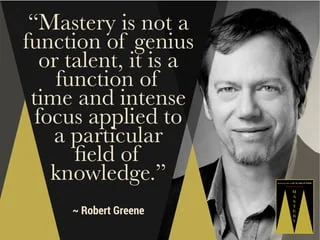
You already have the talent within you – all you need is a proper direction, routine and mindset. This blog is the roadmap. So, let’s start with the first step of the “Journey of Mastery” – by understanding your inner calling.
B. Phase 1: Discover Your Calling
“Recognize yourself – this is where mastery begins” Robert Greene says:
“Your calling is not random. It’s coded in your DNA. You just need to observe and listen carefully.”

You have a kind of inner power that wants to direct you towards the work of your life. You have to reconnect with this inner power of yours.
Robert Greene has said that da Vinci was an illegitimate child, who did not get formal education. But he had a different obsession with nature and the mechanics of machines. As a child, observed the wings of insects, studied the flow of water, and break things to try and understand their mechanism. He decided not to limit himself to just painting but pursue all the arts and sciences of his interest.
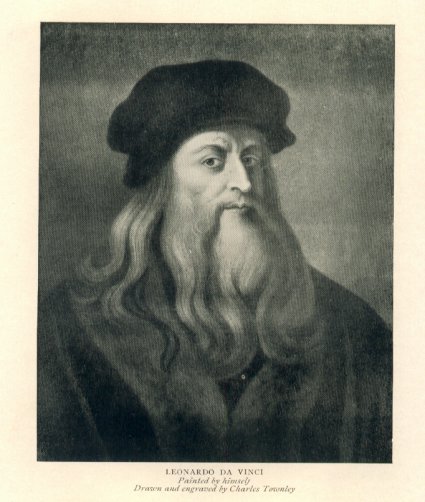
He achieved deep mastery in painting, anatomy, engineering, architecture — all because he followed his curiosity. That’s the first step to mastery.
✅ Practical Techniques for Students & Professionals:
1. Keep a Curiosity Journal
Our thoughts determine our mental perspective. Keep a small diary every day in which you write:
• What topic piqued your interest today?
• What activities do you find time consuming?
• What books or YouTube channels naturally attract you?

2. Reverse Engineer Your Idols
Think: Who is your ideal role model?
• How did his career begin?
• How did he make decisions?
As Robert Greene explained:
• Benjamin Franklin developed his interest in writing while working in the printing press.
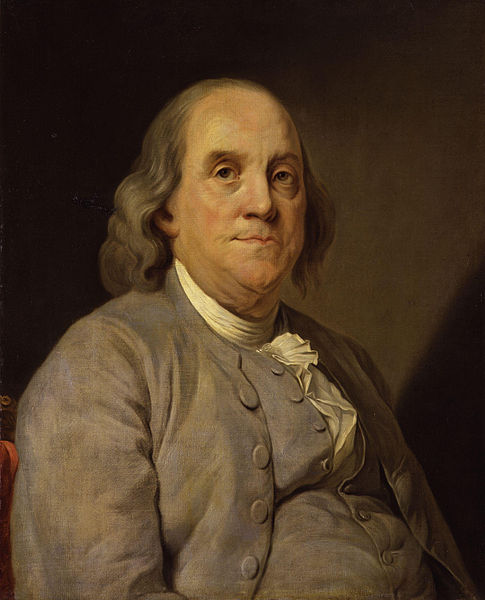
• Temple Grandin, who was born with autism, travelled to become a revolutionary livestock scientist by deeply observing the behaviour of animals.
3. Do mini-experiments
in your interest area:
• Do a small online course that teaches something according to your interest.
• Talk to a mentor who you feel can help you develop according to your basic nature.
• Note all those activities in which you have no interest at all and you feel that you are doing that work only under social pressure.
• Whatever work you are doing now, try to do it in your own unique way. No matter what the work is, you should have a shadow over him.
Just like da Vinci did — observe deeply and experiment constantly.
“You were born with a calling. To ignore it is to waste the one life you’ve been given.” – Robert Greene
C. Phase 2: Submit to the Process
“Apprenticeship Phase – Keep Ego aside during the journey of learning”
Work starts with motivation, Apprenticeship is necessary to reach Mastery.
In this phase you have to learn the deep rules of your subject, skill or profession – small things, which are not visible on the surface, but form the real foundation of success.
Robert Greene says: “The goal of apprenticeship is not money, fame, or title. It is transformation.”
Real life examples:
People think that Darwin is a genius who suddenly created the “Theory of Evolution”. But the reality? Darwin quietly observed for 20 years, took notes, collected samples, and slowly built understanding.
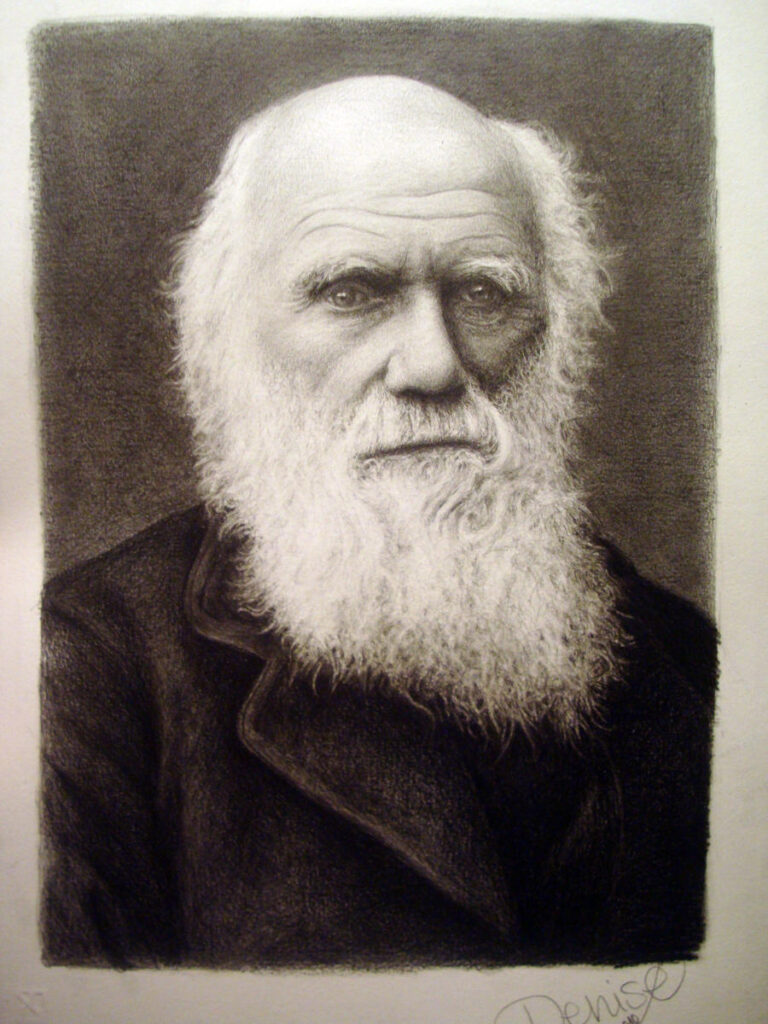
He went on a ship voyage and observed different animals, insects and birds non-stop – he took life as his teacher and started noting down every single teaching. That was his apprenticeship.
2. Wolfgang Amadeus Mozart
We consider Mozart a “born genius”. But Greene clarifies – Mozart practiced intensely under his father till the age of 13, and learned by copying the compositions of other musicians. His “creative genius” was a result of his relentless early practice – not just talent.
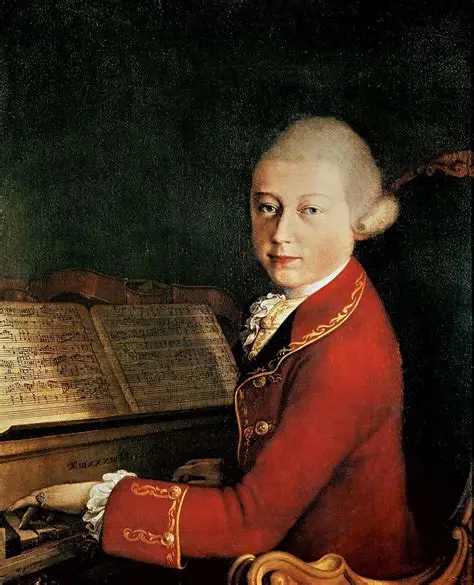
✅ Practical Steps of Apprenticeship Phase:
1. 🧘 “Be an Empty Cup” — Remove Ego, Prioritize Learning
When you start learning, leave your ego at home. Don’t think “I know everything,” don’t think “I am a slow learner.” During this time, you have to learn how to face criticism, how to make yourself restless and focused.
2. 🧪 Practice Deliberately, Do Not Practice Randomly
• Whatever you are reading or learning, set aside your thoughts about them, the old methods, and what other people say — let go of all these prejudices.
• In the book of life, there are certain unwritten rules that exist — and they are often more important than the written ones.
• You should not complain about which rule is right or wrong. You don’t have to become moral; you just have to understand them.
• You will be like a hunter in the jungle — the more knowledge you have about your system, the greater your chances of survival and success.
3. Increase your self-awareness
• During this process, you will get to know a lot of interesting things about yourself, which you did not know before.
4. Find a mentor
Whether it is a teacher, a senior, or an online guide — seek feedback from an experienced person.
Robert Greene says:
“The right mentor speeds up your growth tenfold.”
🧭 Common Student Confusion: “You don’t get results even after practicing so much!” but Robert Greene says:
“The first months or even years will seem boring and unproductive. But your brain is rewiring itself and until you surrender in the process of learning, you are not worthy of becoming a master”
So if you feel that the progress is slow, then understand — your brain is silently becoming a master.

D. Phase 3: The Creative-Active Phase
“When Intuition Emerges From Practice” Robert Greene says:
“After years of apprenticeship, the mind becomes so familiar with the field that it starts seeing patterns and making connections instinctively. This is the Creative-Active Phase.”
Meaning: When you have practiced something so many times that it is no longer just a memory—it has become part of your way of thinking.
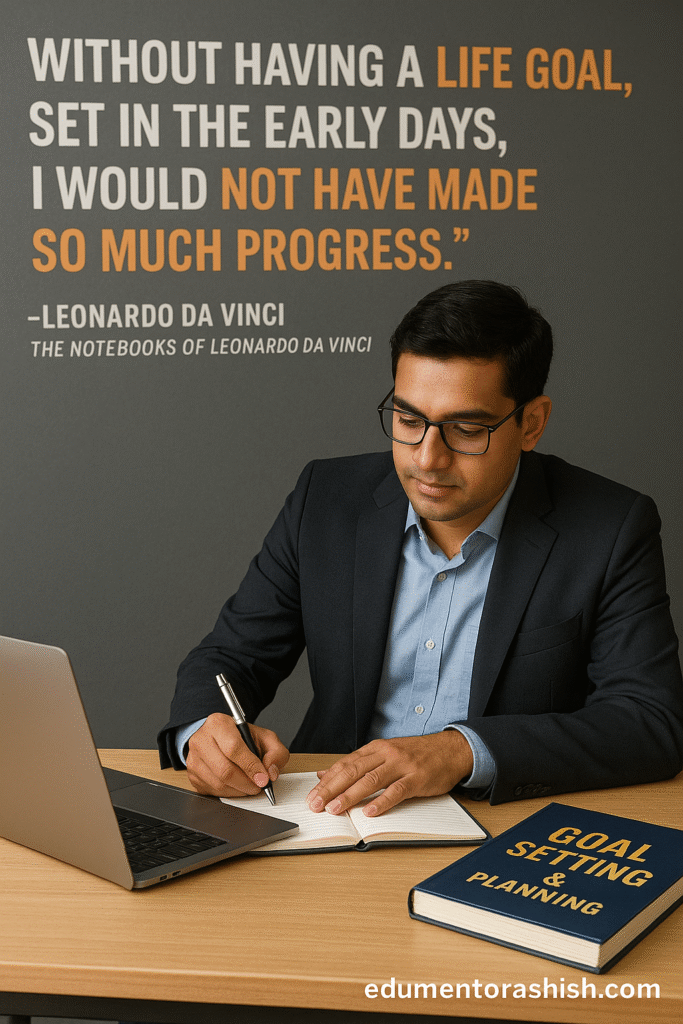
In this phase you:
• start thinking from new angles
• make designs from your mistakes
• and turn knowledge into creative output
Real-Life Example:
1. Freddie Roach (Boxing Trainer)
Freddie Roach was a boxer who was suffering from Parkinson’s disease. When he had to quit boxing, he started training. He used his years of practice experience and made it an instinct. He would watch a boxer’s stance and pick up his weakness. That’s Creative Intuition.
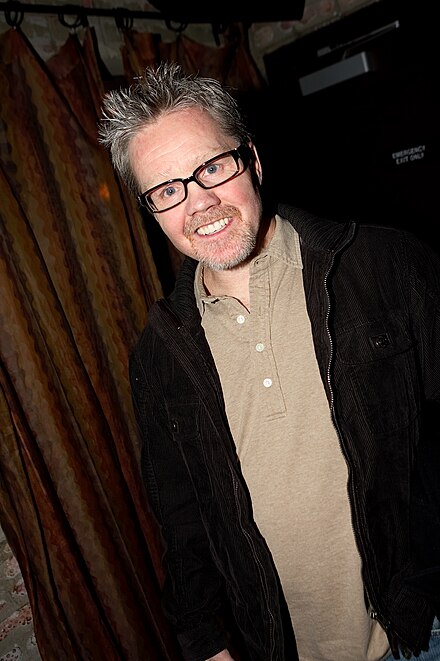
2. Henry Ford
Henry Ford observed traditional car-making and then developed a new technique — assembly line production. He creatively applied decades of mechanical understanding and brought about a new revolution in the world.
Robert Greene writes: “Ford didn’t just copy — he reshaped the process with insight earned from deep mastery.”
💡 How to Enter This Phase:
✅ 1. Cross-Pollinate Your Skills
Combine the things you know.
• Your subject + Visual Learning → Make short explainer reels.
• Lab Work + Writing → Start a student blog explaining instruments.
When two areas meet, innovation is produced from there.
✅ 2. Start Creating – Don’t Just Consume
• In preparation of competitive exam: Make your own flashcards.
• Make reels of study tips (like “3 mistakes I made before my last exam”).
• Visually design your notes on PowerPoint.
👉 When I was preparing for competitive exams, I used to learn the adverse effects of drugs by creating pictures and poems about them. These unique methods helped me connect deeply with the subject.
✅ 3. Do a weekly “idea dump”
Every Sunday or Friday, open a notebook or digital doc and write:
• What new did you learn this week?
• What idea came to your mind but you did not implement it?
• Can I understand a topic in a new way?
This habit will shift your mind from linear study to creative thinking.
✅ 4. Avoid Copy-Paste Learning
When you depend 100% on someone else’s notes or videos, your brain goes into passive mode. Mastery comes when you start thinking for yourself – not just follow. During this you may feel boredom, fear, insecurity and frustration but do not react or worry about them, these are part of this process.
E. Phase 4: Mastery – When you become a genius of your skill
“This is not the end, this is the beginning of something timeless.”
Robert Greene says:
“Mastery is not about having power over others. It’s about having power over yourself — and your craft.”
When you pass the Apprenticeship and Creative-Active phase, you enter a new dimension. You are no longer just a follower of knowledge, you are a creator of knowledge. This is the zone where true innovation and timeless contribution begin.
Real-Life Examples:
Albert Einstein
Einstein began studying theories of classical physics at the age of 16. During his apprenticeship he did mathematical calculations and abstract thought experiments for years. Then one day he took a creative leap — creating the Theory of Relativity — which changed the paradigm of physics.
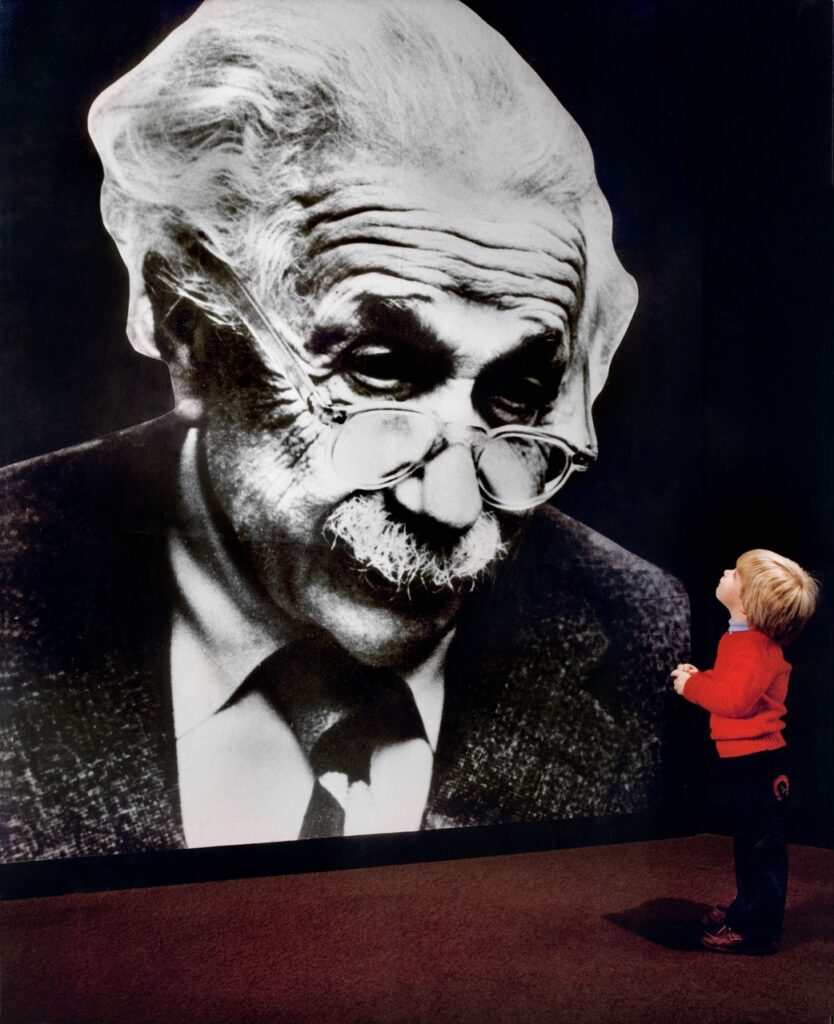
“He didn’t just learn the rules; he redefined them.” – Greene
Johann Wolfgang von Goethe (The Renaissance Master)
Goethe was a poet, scientist, philosopher, and statesman — a “complete master” according to Robert Greene. Through his work he left a deep impact on German literature, botany, and even psychology. Goethe’s work created a whole cultural legacy — this is the Final Stage of Mastery.
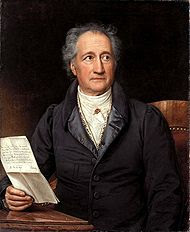
🔥 Practical Signals of Mastery Phase:
✅ 1. You Start Seeing Patterns Instantly
• You do not take time to understand topics or problems.
• You can predict what the next step will be.
E.g. A teacher becomes a true master when, during a lecture, he can sense in advance which questions students are about to ask. It’s like in cricket, where a batter anticipates beforehand where and how the next ball will come.
✅ 2. You Build Your Own Systems
• Develop your own unique technique to do your work
• Trust the system you have built and always be ready for necessary updates in it
These are signs that you are not copying, you are creating.
✅ 3. You Inspire Others Automatically
• Your juniors, students, or colleagues are not impressed by your work, but are inspired.
• You offer mentorship without ego — because you know how real value is created.
“The mark of true mastery is generosity — passing on what you’ve earned.”
✅ 4. You Start Leaving a Legacy
• Your work becomes a resource for others to develop
• Your name lives on the lips of people who have never even met you — because your impact now reaches far beyond yourself

🌟 Practical Exercise: “Mastery Tracker”
| Indicator | Are You Here Yet? |
| 🔄 I can instantly recall and explain complex concepts | ✅ / ❌ |
| 🧠 I often get ideas that combine two different domains | ✅ / ❌ |
| 👨🏫 People ask me for help or mentorship | ✅ / ❌ |
| 🧭 I’ve developed my own approach/system | ✅ / ❌ |
| 📚 I’m building something that others can learn from | ✅ / ❌ |
If you are still only in the Apprenticeship Phase, then don’t worry. Every Master started from there.
🪄 Focus on progress, not perfection.
📈 Mastery is not a straight line — it’s a spiral staircase.
🎯 And at every step, you get closer to the genius within you.
F. Conclusion: Mastery is a Lifelong Game — But Every Step is Worth It
Whether you are a student preparing for competitive exams, or a teacher, doctor, researcher or entrepreneur – the journey of Mastery is different for everyone, but its fundamental steps are the same for everyone. The path shown by Robert Greene in Mastery is not a shortcut – it is a slow, intentional and deep path of learning.
You should see 4 Powerful Phases in this blog:
🔹 Phase 1: Discover Your Calling
Understand your inner natural interest – awaken it again, which has been suppressed by society.
🔹 Phase 2: Apprenticeship Phase
The journey of learning by keeping aside hard work, practice and ego – without running after success too soon.
🔹 Phase 3: Creative-Active Phase
When you start thinking, creating and innovating on your own – and knowledge becomes your weapon.
🔹 Phase 4: The Mastery Phase
When your work becomes your signature. When you become an inspiration for others. When your learning becomes a legacy.
✨ What is the real reward of Mastery?
Not just a good job.
Not just a certificate.
Not just an award.
Rather, an inner satisfaction – that I gave my best, I followed my calling, and I created something that the world missed.
Call to Action: Take the first step of Mastery from today
📝 Give just 10 minutes to yourself tonight.
Ask yourself 3 questions:
1. What things do I feel curious about without pressure?
2. Am I still dependent on motivation only, or am I creating a system?
3. Am I just learning, or am I also creating?
If you have written an honest answer to any of these questions – then understand that you have embarked on the path of Mastery.
🌐 Want More Support on Your Mastery Journey?
📚 Visit EdumentorAshish.com
You will find:
✅ Study Techniques that actually work
✅ Career clarity tools
✅ GPAT / Pharma Entrance prep
✅ Motivation + Mindset Blogs
✅ Teacher & Student growth content
✅ Free ebooks, videos & more
You can also visit our YouTube channels:
💬 “If you are on the journey of Mastery, then I am your companion.” – Dr. Ashish Pathak
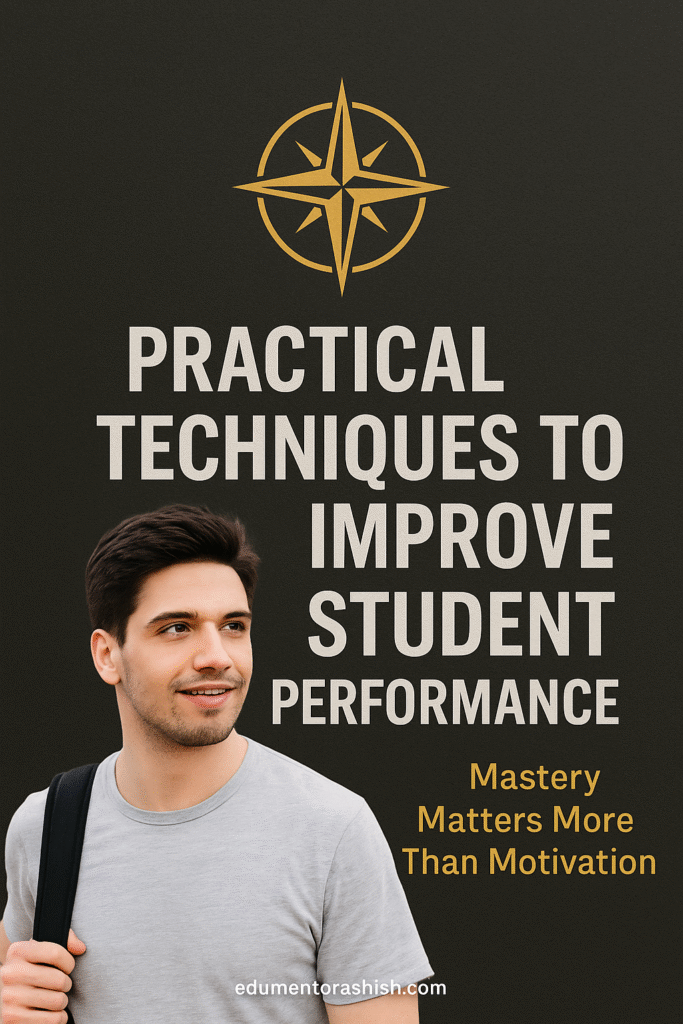





Thank you for the auspicious writeup It in fact was a amusement account it Look advanced to far added agreeable from you However how can we communicate
Thank you very much for your appreciation, feel free to write me at edumentorashish@gmail.com